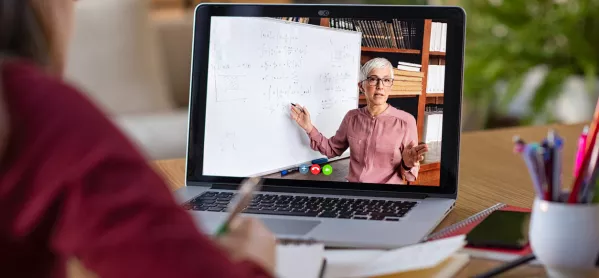Why we run webinars for parents about our pedagogy

About a year ago, I was scheduled to deliver a seminar at the annual Council of British International Schools conference.
But with the Covid crisis escalating the conference had to be cancelled. When asked to instead deliver my session as a webinar, I was not thrilled but, with some cajoling, it went ahead and I was so glad I did - I had discovered a new media for communicating.
One year on and I now feel I am comfortable with webinars, as most of us are. I am the founder of WomenEdBeLux, and we deliver all of our events online, which has increased our audience significantly.
Equally, I have attended a range of events - from continuing professional development sessions to meetings and celebrations - and have learnt great ways to share and interact with attendees from breakout rooms, including live chats, polls and more elaborate tools, such as Miro and Padlet.
Parent webinars about pedagogy
As this confidence has grown, we have, at St George’s International School, Luxembourg, expanded our use of webinars - including explaining to parents about the pedagogical approaches we use.
After all, we realised that this was an area that we could improve on by communicating with them about our approach to teaching - and online webinars were the perfect way to do this as everyone was increasingly comfortable operating in this way.
This is also especially important in an international school as we have more than 50 nationalities of families in our community, meaning there is a huge range of schooling experiences and learning methods that parents have experienced.
So, since September, we have introduced a regular cycle of webinars, covering everything from Learning in Phonics, early years foundation stage (EYFS), maths, relationships and sex education, and more. Typically the sessions last from 40 minutes to an hour and are held first thing in the morning, or at a lunchtime, to fit in with parents’ schedules.
Time to explain
This has been a great way to show our methods to parents and to explain the underlying pedagogy. For example, in a recent webinar on the use of CPA (Concrete/Pictorial/Abstract) in maths, there were more than 70 participants.
The key stage 1 leader was able to take the parents through a range of ways to use concrete resources to underpin mathematic concepts practically.
She had added some helpful video clips filmed in school to demonstrate the relationship and progression from concrete to pictorial representation, and finally to abstract methods.
This practical, interactive webinar received a positive response from parents, generating high levels of effective questions, and proved an important opportunity for myth-busting.
Outlining our approaches
For example, parents often believe that the CPA method would not be suitable for older children, and yet we were able to demonstrate the importance for all year groups.
As a result, our parents have now reflected that they feel much better equipped to support their children at home, with many parents commenting that they found the teaching videos enlightening as they gained a deeper understanding of our methods.
One parent said: “I’d like to put my appreciation down in mail for this webinar. It was extremely useful. We understood the method to be used to explain maths concepts and questions to our children. It is always good to reaffirm at home the concepts being used at school.”
Already, parents have asked for a second session to support KS2 maths. Upcoming events include bespoke sessions for EYFS parents who often have many questions as they join the school.
We have also planned a webinar on transition, to explain how students move from one phase of learning to the next. As parents are putting in new requests, and letting us know where they would like additional support, we are working to add to our programme.
Active involvement
One of the beauties of the webinar is that parents can attend from home or the workplace without the need to take time off work.
Equally, the sessions are recorded so that a webinar can be shared after the event or watched again. This way, all can benefit.
Our parent webinars also offer a further dimension: when done well, they can be shared with a wider audience and uploaded to parent and staff portals - as they are often very useful for new or less experienced teachers, who may not be familiar with our in-house style.
By watching the recordings, they can soon gain concrete examples of successful methods and pedagogies.
Key webinars will now be stored in a resource bank alongside plans, resources and exemplar work, enabling teachers to learn from colleagues. These, too, will become an invaluable resource for inducting new staff.
We have come a long way in a year. We have all learnt new skills and found ways to think outside of the box in order to improve our practice.
A year ago, I would have avoided a webinar and yet now I see it as one of my most impactful tools for sharing - it is most definitely here to stay.
Claire Nuttall is headteacher at St George’s International School in Luxembourg
You need a Tes subscription to read this article
Subscribe now to read this article and get other subscriber-only content:
- Unlimited access to all Tes magazine content
- Exclusive subscriber-only stories
- Award-winning email newsletters
Already a subscriber? Log in
You need a subscription to read this article
Subscribe now to read this article and get other subscriber-only content, including:
- Unlimited access to all Tes magazine content
- Exclusive subscriber-only stories
- Award-winning email newsletters